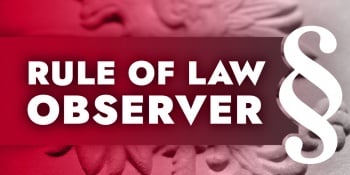Published: 03.11.2022

In the Summer 2021, The European Commission has published information on an initiative entitled. "Equality Bodies - Binding Standards". Subsequently, on the basis of a published document ('roadmaps') outlining the Commission's legislative ideas, the public was given the opportunity to participate in a public consultation and send in their views. However, the most interesting is yet to come, as for the fourth quarter of 2022. Commission has announced the adoption of the initiative. This means that we should soon already have concrete ideas and solutions that the Commission will be seeking to implement.
What worries the European Commission?
In the communication on the occasion of the publication of the initiative, it was pointed out that equality bodies have the task of promoting equal treatment by helping victims of discrimination, carrying out independent studies, publishing independent reports or making recommendations.
Indeed, the EU Directives require all Member States of the Union and countries in the European Economic Area (EEA) to have designated equality bodies to promote equal treatment. Equality bodies were first established under the Directive on the implementation of the principle of equal treatment between persons irrespective of racial or ethnic origin (2000/43/EC). At that time, they were entrusted with promoting equal treatment by assisting victims of discrimination, carrying out independent surveys, publishing independent reports and making recommendations on discrimination. The three subsequent equality directives entrusted the equality bodies with the same tasks (promotion of equality). Three subsequent equality directives gave the equality bodies the same tasks (promoting equality) in their respective fields: the Directive implementing the principle of equal treatment between men and women in the access to and supply of goods and services - in the area of goods and services (2004/113/EC), the Directive on implementing the principle of equal opportunities and equal treatment of men and women in matters of employment and occupation - in the area of employment (2006/54/EC) and the Directive on applying the principle of equal treatment between men and women engaged in an activity in a self-employed capacity - in the area of self-employment (2010/41/EU). The latter two added an additional mission to exchange information with the relevant European bodies.
What worries the EC is the challenges related to the functioning of these bodies, as their mandate, powers, status, independence, resources and effectiveness vary from one EU country to another. The aim of the Commission's initiative is therefore to strengthen the equality bodies by setting minimum standards for how they operate in relation to all aspects of discrimination and areas covered by EU equality legislation.
It is worth noting that the take-up of this topic is most likely the result of action by the equality bodies themselves. As early as 2016, Equinet, the European network of specialised equality bodies, argued that equality bodies needed more effective regulation. It was pointed out at the time that current EU legislation does not guarantee equality bodies full independence, which translates into a lack of efficiency and sufficient powers to effectively protect victims of discrimination. In the document prepared at the time, 'Developing standards for equality bodies. Equinet working document'[4] the authors pointed out the problems and limitations arising from the fact that the Directives only provide for minimum standards with regard to the competences of equality bodies and their limited independence in action. EU law, on the other hand, does not guarantee them full independence, effective action, sufficient powers and adequate resources. The European Commission's initiative appears to be a response to the claims made by equality bodies.
However, given that the mission of equality bodies is essentially only to promote equality, is greater independence and agency really necessary and is this the right direction?
Action plans
The roadmap for the initiative (then still referred to as the roadmap) published in 2021[5] shows that equality bodies face a number of obstacles in their current state of operation, which, let us emphasise again, is limited to the promotion of equality.
The European Commission points out that the problems equality bodies would like to address include too much freedom for states in terms of the mandate, powers, independence, effectiveness and resources of these bodies. As a result, "most equality bodies face challenges in terms of their effectiveness in carrying out their missions" and "there are significant differences between Member States in terms of the mandate, powers, independence, resources and effectiveness of their equality bodies, resulting in unequal protection against discrimination across the EU". Furthermore, it is "very difficult for the Union to monitor/evaluate the performance of equality bodies due to their wide diversity and lack of "binding minimum standards" and "the equality data currently collected by the Equality Bodies does not allow for proper monitoring of the activities of the Equality Bodies or of the state and evolution of discrimination in the EU".
Such an approach would be understandable if it were not for the fact that equality bodies have, as the Commission itself points out, a remit to "promote equal treatment by assisting victims of discrimination, carrying out independent research, publishing independent reports or making recommendations". With such a mission outlined, it would seem that adequate resources (human and financial) and powers (access to data) are indeed crucial to the proper functioning of such bodies. These issues regulated at EU level would indeed guarantee certain minimum standards, but it is questionable whether such central EU regulations are really necessary. The fact that, today, different EU member states have different, specific and thus adapted to the prevailing culture, customs and needs in a given country does not necessarily mean that this is inappropriate. Rather, the opposite can be assumed - such an individualised approach in regulation is in principle beneficial. The only drawback seems to be what the EC draws attention to in passing, so to speak - namely the central monitoring of the activities of equality bodies and the state and evolution of discrimination in the EU. In a nutshell, the lack of top-down, uniform regulations imposed on all Member States is therefore a thorn in the EU's side, as it prevents the exercise of total control over these bodies and the aggregation of data on the "state and evolution of EU discrimination". However, the concepts of 'equality' or 'discrimination' themselves are evolving very dangerously in the EU, aggregating more and more absurd meanings and further 'fields' of inequality (such as the undefined and extremely broadly defined 'hate speech' or 'hate crimes'). Consequently, the granting of more competences and capacities to bodies which, in turn, would become largely dependent on the EU (which would be responsible for a large part of the regulation of their activities and, on the other hand, would monitor their activities) could mean another attempt to influence the EU Member States, which to this day resist ideologically exploited slogans of "discrimination", which in reality aim at granting privileges to certain social groups.
"Kindness" has not succeeded
The interpretation indicated seems to be confirmed by the Commission itself, which indicates in its action plans that "the 2021 Staff Working Document underlines that the 2018 Recommendation, which is a non-binding act, has only been partially implemented by the Member States. Only four Member States are preparing legislative reforms in line with the Recommendation and around ten Member States have initiated some changes'. It is worth noting that the Commission's recommendations were and remain non-binding - Member States are under no obligation to implement them, they can disagree with them, they can ignore them, and they do not have to explain their actions (or lack thereof) in any way in this regard. The European Commission, meanwhile, assumes that a failure to listen to non-binding recommendations may give rise to the development of standards which, already in the form of binding regulations, would introduce the changes expressed in the recommendations. However, the Commission must be credited with having largely bent over backwards to address the lack of human resources, which is indeed a major contributor to the limited activities of equality bodies in EU countries. These bodies often fail to fulfil their tasks (e.g. carrying out surveys) due to a lack of human resources to carry out such surveys in a professional and systematic manner.
Direction for change
The European Commission should soon present the conclusions of the public consultation already carried out and the opinions provided to it, and we will probably know them together with a preliminary draft of the new rules. Only then will it be possible to assess to what extent these regulations are actually intended to improve the legitimate work of the equality bodies, and to what extent they are handing over control to a central authority in Brussels. This topic should definitely be monitored, because in the long run, the new EU regulations may affect the internal laws of the Member States by introducing specific provisions explicitly referring to concepts such as 'hate speech' or 'gender discrimination'.
Anna Kubacka - Analyst of the Ordo Iuris International Law Centre

02.05.2025
· The Ordo Iuris Institute, the Hungarian Center for Fundamental Rights, and the Foundation of the Patriots for Europe group in the European Parliament organized a conference in W

09.04.2025
• On April 8, the Ordo Iuris Institute presented the Polish version of a document with proposals for reforming the European Union, prepared jointly with Hungary’s Mathias Corvinus Collegium (MCC).

08.04.2025
Sixth Court Hearing Ends Without Progress

07.04.2025
In response to the liberal left’s self-proclaimed “militant democracy” in Poland and